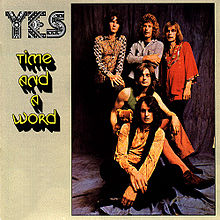
Time and a Word (1970)

1. No Opportunity Necessary,
No Experience Needed
2. Then
3. Everydays
4. Sweet Dreams
5. The Prophet
6. Clear Days
7. Astral Traveler
8. Time and a Word
As for the band’s sophomore effort, Time and a Word, it represents a curious paradox—an album that reaches for bigger ideas but somehow lands with less impact. Perhaps responding to lukewarm sales of their debut, Yes returns here with broader ambition and bolder strokes. But not all experiments yield gold. This time around, the band layers in a full string section on several tracks, and the results are a mixed bag at best.
The album opens with a cover of Richie Havens’ No Opportunity Necessary, No Experience Needed, which begins promisingly with a thunderous organ fanfare courtesy of Tony Kaye—only to be ambushed moments later by an overbearing string section. It’s a strange tonal collision, and while the orchestra may have seemed like a fresh idea on paper, it rarely meshes organically with the band’s sound. Their other cover, Buffalo Springfield’s Everydays, also feels like it’s straining for sophistication rather than embracing it.
The decision to embed orchestral elements throughout the album ultimately caused tension within the band, most notably with Peter Banks. His guitar presence is noticeably muted here, both in the mix and in spirit. It wasn’t long after the recording wrapped that he was out—and by the time the album hit store shelves, the band had already swapped his image on the cover for that of his replacement, Steve Howe. Subtle, it was not.
To be fair, Time and a Word isn’t without merit. Then and The Prophet bear traces of the band’s emerging identity, even if their execution feels slightly heavy-handed. Bruford continues to play like a man trying to outrun gravity—technically dazzling but sometimes at odds with the material. Astral Traveller veers into space-rock territory, and while its ambition is admirable, it feels more like a genre exercise than an authentic Yes statement.
Still, there are flashes of clarity. Clear Days is a delicate chamber-pop piece where Anderson’s gossamer vocal floats effortlessly atop a string section that—for once—knows when to hold back. And the title track, Time and a Word, is arguably the album’s high-water mark, gracefully marrying its orchestral flourishes with Anderson’s soaring optimism. It’s no surprise that it’s the track most fans remember.
Time and a Word may not be a flawless record, but it’s a bold one. At its best, it shows a band unafraid to overreach in pursuit of something greater. And though the results are uneven, it’s hard not to admire the nerve it took to make such an ambitious misstep. Growing pains? Absolutely. But also the sound of a band refusing to sit still.
Go to the Next Review
Go back to the main page